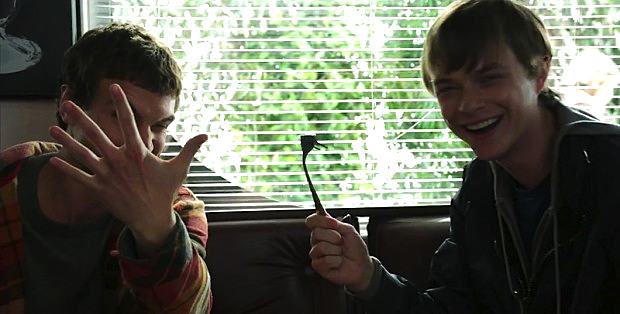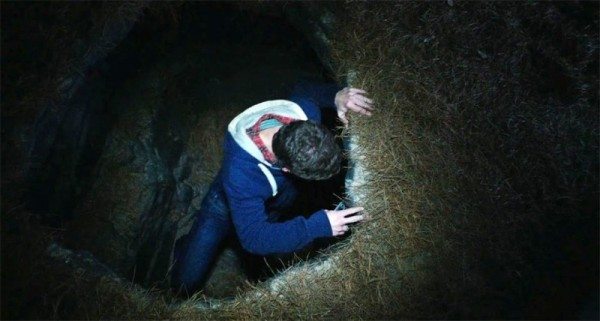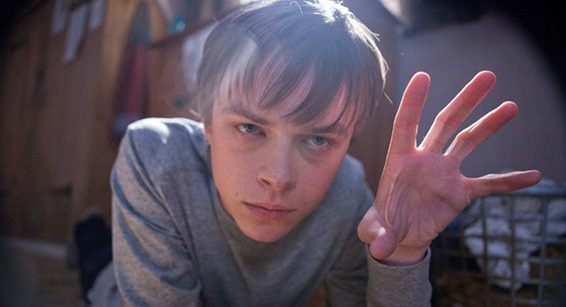The idea of constructing a movie out of what purports to be — but isn’t — found footage is not necessarily a bad one. The “found footage” conceit lends a level of hyper-naturalism, a kind of camera phone-captured really really real life, in theory. That it’s been used so often for horror and SF movies recently makes a degree of sense as well, as suspension of disbelief is a concern in both genres. Inevitably, there’s a point at which it becomes almost impossible to sustain the conceit — usually toward the end of the second act and in the third — but with Chronicle, writer Max (son of John) Landis and director Josh Trank have made a good enough movie that, when the found footage conceit occasionally falls apart, in the end it doesn’t really matter.
What makes Chronicle work is, in large part, its main characters. It opens with Andrew (Dane DeHaan) turning on a new video camera, which he’s acquired primarily to document his troubled father’s abuse of Andrew and his ailing mother. Andrew starts bringing the camera to school, documenting his cousin and only friend Matt (Alex Russell) name-dropping Schopenhauer, Jung, and Plato and blowing off first period to smoke weed, as well as the bullying Andrew suffers from the cool kids and the effortlessness with which he creeps out cheerleaders in particular and girls in general. This is all established immediately and vividly, without belaboring Andrew’s (and, to a lesser extent) Matt’s difference from the rest of their classmates.

One fateful night, at a massive rave out in the woods, Andrew — having been essentially thrown out for refusing to stop filming — meets popular athlete and class president Steve Montgomery (Michael B. Jordan), by his own admission extremely high, who insists that Andrew come with him and Matt to see something, which turns out to be a hole in the ground clearly made artificially, from which odd sounds emanate. Naturally, being teenage boys, they jump right in to see what’s inside. What happens next isn’t exactly clear. They find Something Weird. And then suddenly it’s several days, perhaps even weeks later, and Andrew, Matt, and Steve find themselves able to move objects with their minds.

Leaving the particulars of the story there (as that’s only about half of the movie’s first act), what makes Chronicle such an engrossing movie is how the advent of this supernatural ability affects each of the three friends. Matt, the name-dropping scholar manqué, thinks about the implications of this power and hesitates to use it. Steve, the aspiring politician, primarily uses the power in private and to help the socially awkward (and thus disadvantaged) Andrew. As for the socially alienated, angry (and, atypically for angry loner characters, not terribly cerebral) Andrew, well, both the idea that the way in which each character uses the power reveals something about their inner life, as well as the shockingly spoiler-ridden trailer can give you some idea.
Until the climax, from which most of those shots in the trailer of cars flying around are taken, Chronicle is pretty thought-provoking supernatural SF. As any number of people have already pointed out, it bears a distinct resemblance to Carrie, but with the crucial distinction of changing the protagonist’s gender. Where Carrie was victimized by the society that shunned her for her Otherness and pushed to the breaking point, Andrew in Chronicle has a choice, and his lashing out is more a reaction to his emasculation, the revocation of his (whether he thinks so consciously or not) societal power, rather than simply not ever having had any. The movie doesn’t make a big deal out of this distinction, but it’s all there on the screen. It does, however, make the resolution of Chronicle a little less simultaneously horrifying and cathartic than the ending of Carrie. It actually isn’t really either thing at all, which blunts the impact of all the fresh and original elements that came before, and the picture ends on a particularly blatant violation of the found footage conceit — and yet, that doesn’t mean that the movie isn’t good.
Chronicle is definitely worth seeing for what it gets right. The whole is a bit rickety, and less than the sum of some of its parts, but it’s trying something new and has a strongly-written trio of main characters. For that alone, SF fans willing to overlook some occasional aesthetic bumpiness should check this out.
Danny Bowes is a filmmaker and writer, whose work has appeared on nytheatre.com and premiere.com. He writes a weekly column each Wednesday at Hudak on Hollywood and reviews Asian cinema for Next Projection.










